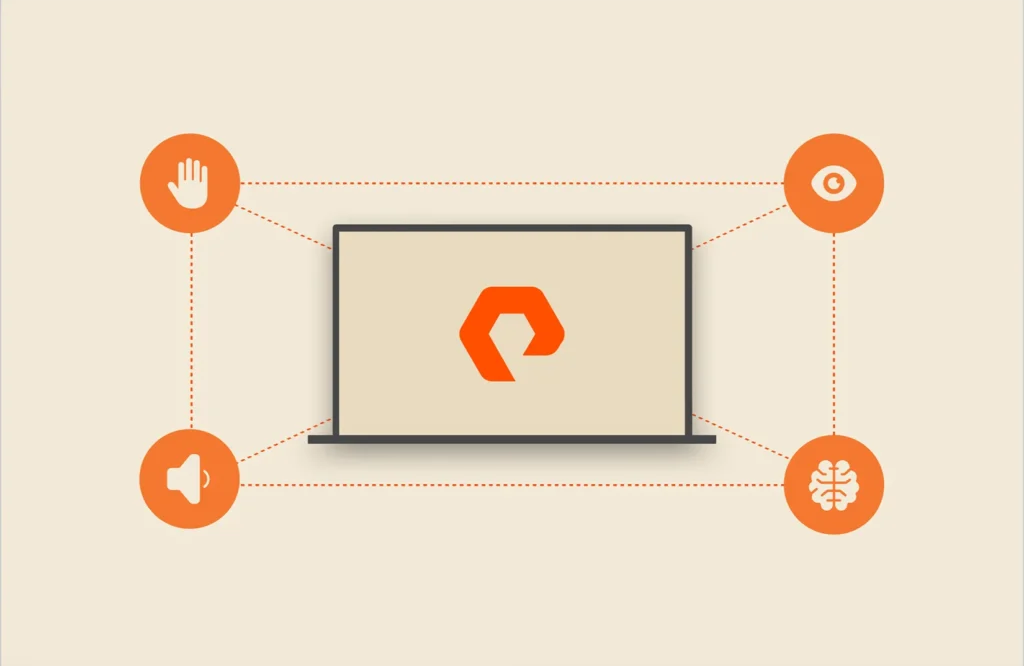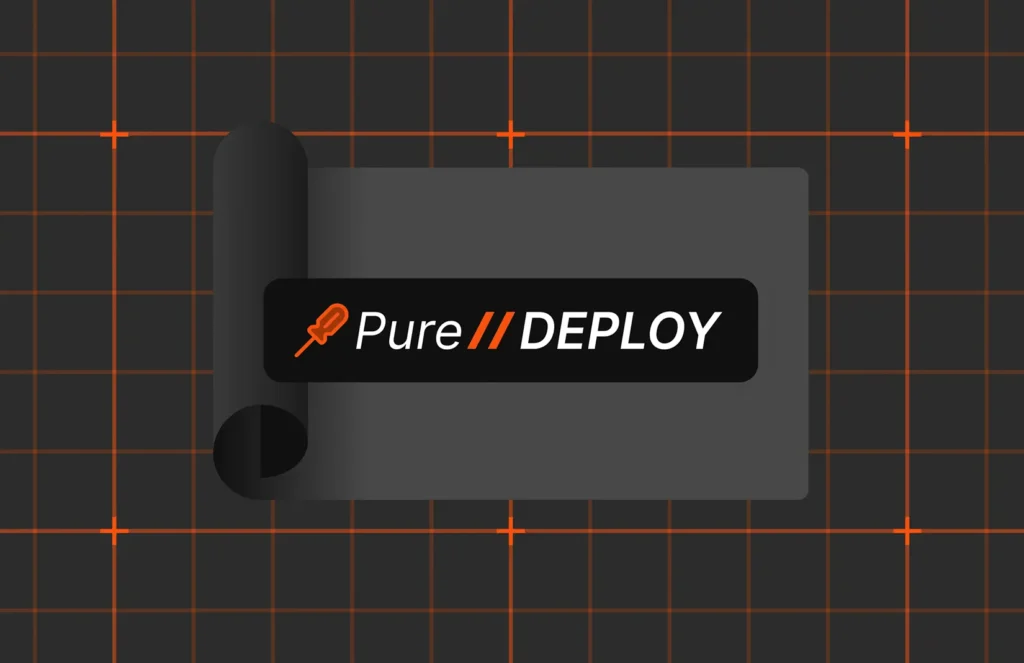Folding@home is a distributed computing project aimed at helping scientists develop new therapeutics for a variety of diseases—with a current focus on COVID-19—by harnessing computing power from volunteers around the globe to simulate protein dynamics. Folding@home leverages the unused processing power of personal computers to create a high-speed, high-performance system on which to run its one-of-a-kind research platform.
Pure Storage® CEO Charlie Giancarlo discusses the importance of the Folding@home mission.
Earlier this year, Pure donated a FlashBlade® system for use by Folding@home, which completely changed the project’s approach to storage. They had been faced with hundreds of thousands of redistributed workloads, all of which were sending small bits of data to a core or cloud to be processed and then to a high-performance solution for reassembly that was reaching its limit. With Pure’s unified fast file and object storage platform, Folding@home can separate capacity from compute and accelerate the ability to arm scientists with the bevy of resources needed in their quest to develop a vaccine.
I recently sat down with Dr. Greg Bowman, director of Folding@home, to learn more about the work he’s doing and how we can continue to help him and his team in the future. Here’s an excerpt of that conversation:
Matt: Hopefully by now a lot of folks have seen the Folding@home blog post that talks a bit about the relationship between our two organizations, but really gives a great overview of the Folding@home mission.
We have the utmost respect for what you’re doing, and people are really taking notice of your work. With the world’s eyes on public health at an unprecedented level, what is the number one thing you want people to understand about Folding@home?
Greg Bowman: Great question, Matt. The key thing I really want to get across to people is that while Folding@home is focused on COVID today, we are really a catch-all platform for advanced medical and biological research. Anything made out of atoms, we’re keen to know more about. Our focus has been on biology, but the scope and potential of this project is so incredibly broad, which I hope people will appreciate.
And after the urgency of COVID has, hopefully, subsided, we want to carry the momentum we’ve gathered into the battles against Alzheimer’s, Ebola virus, and antibiotic-resistant infections. All of these are major problems that can be considered pandemics in their own right.
Matt: You bring a great deal of personal passion into work with you on a daily basis. How did you personally get involved with Folding@home, and what has your journey looked like since joining?
Greg: I had a juvenile form of macular degeneration so I lost most of my vision when I was about eight years old. I realized at an early age that my life was going to be different than what I might have expected, so I got really inspired by scientific advances happening around that time—things like the cloning of Dolly the sheep or sequencing the human genome. I got so excited about the potential that I could be involved in biological and biomedical research, that I could have an impact on this field. And even if I wasn’t working directly on my own condition, I could contribute to the world’s foundational knowledge—the knowledge that would someday prevent people from having to deal with the same sort of thing. Folding@home provides such an incredible opportunity for me to do that every day, in collaboration with other people who are curious and care, distributed across the entire globe.
Matt: That is truly inspiring. What is so unique and effective about the way Folding@home addresses these types of problems, which have such molecular, granular solutions but require considerations of global scale?
Greg: One of the challenges researchers face is that the computer simulations we run to identify patterns, test potential treatments, etc., are extremely expensive. Solving even easy problems on the nicest available laptop would probably take hundreds of years. So we’ve taken these massive problems, these intractable calculations that would take forever to make, and broken them up into lots of small computations that can be performed completely independently of one another.
With the number of personal devices connected today, we realized there was massive untapped compute power sitting at most peoples’ homes just waiting to be mobilized against the world’s toughest problems. The idea was to invite people via the internet to contribute their compute power to run all these little chunks of calculations, then on our end piece it all together.
Matt: It’s like the ultimate group project.
Greg: Exactly. Just like when you were back in school, except everyone is actually contributing!
Matt: So you have a ton of compute, sourced globally. This is actually a challenge many of our customers are addressing using FlashBlade. What were some of the bottlenecks or challenges you started to see around the data?
Greg: The last numbers we had showed us bringing in about six terabytes of data per hour, and those are now out-of-date. It’s massive. Before COVID, we had 30,000 devices running full time each day, which was letting us routinely run calculations that would have cost millions of dollars in cloud services. Within the last two months, I would guess we have grown by well more than hundred-fold and now have more than 4 million devices folding at home. As you can imagine, storage has become a priority pretty quickly.
Matt: That is certainly an explosion of growth.
Greg: And that’s just a piece of the picture. We have three primary labs, each with two or three servers sending simulations to volunteers and collecting all the data; teams of scientists analyzing the data and deciding what to simulate; etc. We very quickly got into a situation where volunteers were turning on the software and nothing was happening because our servers couldn’t keep up. We got connected to Pure through our extremely active Twitter community, and the timing really couldn’t have been better. With FlashBlade installed, we’ll be able to keep pace with all the simulations and data moving around right now.
Matt: I love that this is such a great example of performance, consolidation, and simplicity—the core tenets of our unified fast file and object FlashBlade approach—coming together to drive value for you. Talk about a serendipitous introduction that was truly meant to be. Sounds like we have Twitter to thank for that?
Greg: It’s funny, our Twitter following has been immensely valuable. One of our volunteers tweeted at me that he had some friends I should chat with who could help with my server-side infrastructure problems. Those friends happened to be you all at Pure Storage. I honestly didn’t even know flash was a viable option over spinning disk, so to discover that there was a potential partner out there so ahead of the game in terms of its vision and capabilities was really incredible. It was like learning that someone had already made a big step toward one of the problems we’re working to solve. There was definitely an immediate kinship.
Matt: I agree. It was so easy for us to want to be involved given your mission. Once we qualified the technology fit, there was no going back.
Why do you think people have so readily connected with the Folding@home mission?
Greg: I think the scale of society sometimes makes us feel helpless as individuals, particularly when there’s a big, looming problem to solve. With COVID specifically, it’s demoralizing to bunker down at home, hide under a rock, and wait for the problem to go away. I think there’s a tremendous mental-health benefit to taking action. And Folding@home gives people a safe, responsible way to be part of the solution on a daily basis. People generally want to make a real, practical difference, but it can be tough to figure out how. I like to think we have helped bridge that gap for people in a way that’s both highly relatable and immediately actionable.
Matt: That’s great. The work that you and your team are doing is so important—thank you—and we’re honored FlashBlade is helping you drive such meaningful outcomes. We look forward to solving more problems together.
Greg: Anytime, Matt. Thank you!
To find out how you can get involved visit Folding@home.
For more information on how Folding@home is leveraging FlashBlade watch the recent “Leveraging the Power of Many to Solve COVID-19” webinar.






